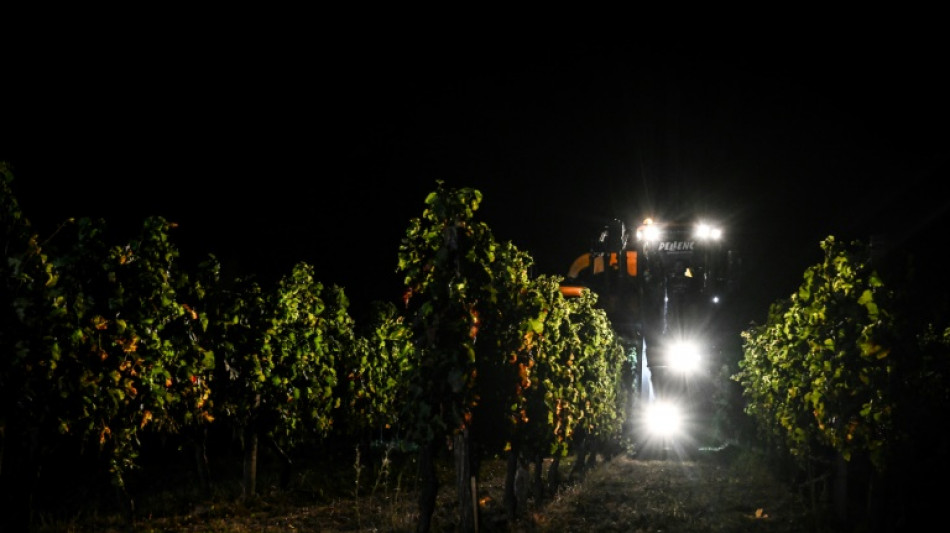
-
 Thailand's pilot PM lands runaway election win
Thailand's pilot PM lands runaway election win
-
Sarr strikes as Palace end winless run at Brighton

-
 Olympic star Ledecka says athletes ignored in debate over future of snowboard event
Olympic star Ledecka says athletes ignored in debate over future of snowboard event
-
Auger-Aliassime retains Montpellier Open crown

-
 Lindsey Vonn, skiing's iron lady whose Olympic dream ended in tears
Lindsey Vonn, skiing's iron lady whose Olympic dream ended in tears
-
Conservative Thai PM claims election victory

-
 Kamindu fireworks rescue Sri Lanka to 163-6 against Ireland
Kamindu fireworks rescue Sri Lanka to 163-6 against Ireland
-
UK PM's top aide quits in scandal over Mandelson links to Epstein

-
 Reed continues Gulf romp with victory in Qatar
Reed continues Gulf romp with victory in Qatar
-
Conservative Thai PM heading for election victory: projections

-
 Heartache for Olympic downhill champion Johnson after Vonn's crash
Heartache for Olympic downhill champion Johnson after Vonn's crash
-
Takaichi on course for landslide win in Japan election

-
 Wales coach Tandy will avoid 'knee-jerk' reaction to crushing England loss
Wales coach Tandy will avoid 'knee-jerk' reaction to crushing England loss
-
Sanae Takaichi, Japan's triumphant first woman PM

-
 England avoid seismic shock by beating Nepal in last-ball thriller
England avoid seismic shock by beating Nepal in last-ball thriller
-
Karl defends Olympic men's parallel giant slalom crown

-
 Colour and caution as banned kite-flying festival returns to Pakistan
Colour and caution as banned kite-flying festival returns to Pakistan
-
England cling on to beat Nepal in last-ball thriller

-
 UK foreign office to review pay-off to Epstein-linked US envoy
UK foreign office to review pay-off to Epstein-linked US envoy
-
England's Arundell eager to learn from Springbok star Kolbe

-
 Czech snowboard great Ledecka fails in bid for third straight Olympic gold
Czech snowboard great Ledecka fails in bid for third straight Olympic gold
-
Expectation, then stunned silence as Vonn crashes out of Olympics

-
 Storm-battered Portugal votes in presidential election run-off
Storm-battered Portugal votes in presidential election run-off
-
Breezy Johnson wins Olympic downhill gold, Vonn crashes out

-
 Vonn's Olympic dream cut short by downhill crash
Vonn's Olympic dream cut short by downhill crash
-
French police arrest five over crypto-linked magistrate kidnapping

-
 Late Jacks flurry propels England to 184-7 against Nepal
Late Jacks flurry propels England to 184-7 against Nepal
-
Vonn crashes out of Winter Olympics, ending medal dream

-
 All-new Ioniq 3 coming in 2026
All-new Ioniq 3 coming in 2026
-
New Twingo e-tech is at the starting line

-
 New Ypsilon and Ypsilon hf
New Ypsilon and Ypsilon hf
-
The Cupra Raval will be launched in 2026

-
 New id.Polo comes electric
New id.Polo comes electric
-
Iran defies US threats to insist on right to enrich uranium

-
 Seifert powers New Zealand to their record T20 World Cup chase
Seifert powers New Zealand to their record T20 World Cup chase
-
Naib's fifty lifts Afghanistan to 182-6 against New Zealand

-
 Paul Thomas Anderson wins top director prize for 'One Battle After Another'
Paul Thomas Anderson wins top director prize for 'One Battle After Another'
-
De Beers sale drags in diamond doldrums

-
 NFL embraces fashion as league seeks new audiences
NFL embraces fashion as league seeks new audiences
-
What's at stake for Indian agriculture in Trump's trade deal?

-
 Real Madrid can wait - Siraj's dream night after late T20 call-up
Real Madrid can wait - Siraj's dream night after late T20 call-up
-
Castle's monster night fuels Spurs, Rockets rally to beat Thunder

-
 Japan votes in snow-hit snap polls as Takaichi eyes strong mandate
Japan votes in snow-hit snap polls as Takaichi eyes strong mandate
-
Pakistan's capital picks concrete over trees, angering residents

-
 Berlin's crumbling 'Russian houses' trapped in bureaucratic limbo
Berlin's crumbling 'Russian houses' trapped in bureaucratic limbo
-
Neglected killer: kala-azar disease surges in Kenya

-
 Super Bowl set for Patriots-Seahawks showdown as politics swirl
Super Bowl set for Patriots-Seahawks showdown as politics swirl
-
Sengun shines as Rockets rally to beat NBA champion Thunder

-
 Matsuyama grabs PGA Phoenix Open lead with Hisatsune one back
Matsuyama grabs PGA Phoenix Open lead with Hisatsune one back
-
How Dental Implants Can Improve Your Quality of Life in Bonita Springs


Climate change pushes Bordeaux winemakers to harvest at night
In France's southern Bordeaux region, the grape harvest is often now done at night to ensure the peak freshness required to obtain the best wine but this is also a response to climate change.
With the country sweltering in a late heatwave, it is 20 degrees Celsius (68 degrees Fahrenheit) at five in the morning as a harvester crawls along a row of vines, powerful headlights helping guide its way through the darkness.
"Harvesting at night is done for the quality of the grapes, their freshness and taste," said the driver, Loic Malherbe, who has been at it for three hours already.
"It isn't bad, it's just life at a different rhythm... It's better for the equipment and for people."
It is already a common practice in several winemaking countries with hot summers but one that is likely to become even more common as climate change accelerates.
Harvesting at night can also help financially strapped growers save money, according to Kees Van Leeuwen, a professor of viniculture at Bordeaux Sciences Agro university.
It means they can skip refrigerating grapes while they are being hauled to be pressed, he explained.
"If harvesting is done at night the temperature of the grapes is lower, especially compared to the very hot days we've had this week," he said.
"There is a huge saving in energy use."
- Dry ice -
The harvester dumps the merlot grapes into bins which the vineyard's owner Stephane Heraud hitches to his tractor to haul to the cooperative.
"It's been 15 years that we've harvested the whites and the roses at night, and maybe one day we'll do that for the reds as well," said Heraud, who also heads the cooperative Vignerons de Tutiac.
"If we harvested at night, we'd have wine that is more oxidised, which in terms of taste is not nearly as nice."
Heraud climbs up onto his tractor and spreads dry ice (-80C, -112F) onto the grapes.
This not only helps keep the grapes cool but reduces the oxygen level in the bins as he drives to the cooperative, which is the largest in one of France's protected designation regions with 500 growers.
Tutiac has specialised in roses and accounts for nearly a third of the total produced in the Bordeaux region.
Its pesticide-free rose caused a stir at a blind tasting conducted by the French wine magazine La Revue des vins de France, being placed fourth among roses from the Provence region which traditionally take top marks in the category.
- Earlier harvests -
That night, growers were expected to dump some 500 tonnes of grapes into the various stainless-steel tanks at the wine press, enough to make half a million bottles of wine.
Tutiac's chief oenologist Paul Oui said consumers like roses that are light coloured and clear.
To achieve that "you have to limit the transfer of the colour from the skin to the juice and the earlier and cooler we harvest the more we can limit the transfer", he said.
Night harvesting is already common in Australia and California due to the heat, and the practice is spreading in the Bordeaux region according to Van Leeuwen.
"For whites and roses, one can imagine that it will become common practice," said the specialist.
Nor did he exclude that it might one day concern grapes for red wine, which account for 85 percent of Bordeaux's production.
Rising temperatures make grapes mature faster and push the harvest sooner and into warmer periods, and Heraud confirmed that harvests were indeed happening sooner and sooner.
"I remember when I was small watching my parents harvesting in November," he said.
"Last year, we were finished on September 30...," he added.
"Anyone who says climate change isn't real isn't a Bordeaux winemaker."
X.Karnes--AMWN


